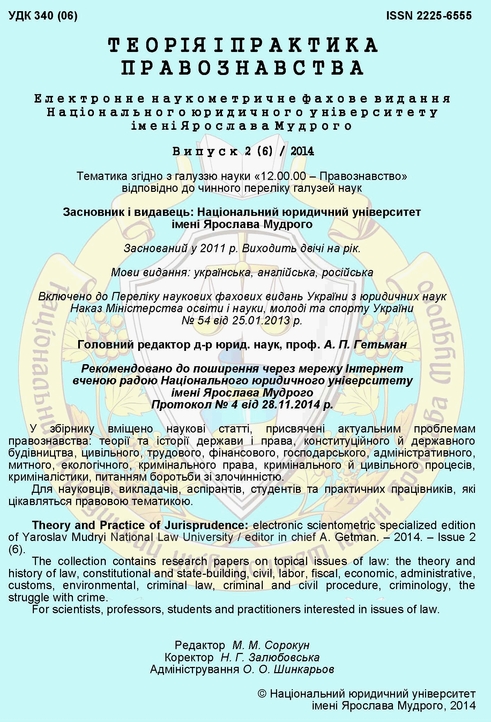International organizations as subjects of international private law
DOI:
https://doi.org/10.21564/2225-6555.2014.2.63700Keywords:
international organization, an international private law, a foreign element, an international entity, a foreign entity, the international agreementAbstract
An integral part of the international legal functioning of international organizations is their participation in civil and economic relations. Participation of international organizations, both intergovernmental and non-governmental, in international relations of powerless character has a certain specificity and raises a number of theoretical and practical issues. An international organization in such relations is a foreign element, the presence of which qualifies relations as international private relations. The volume and types of private transactions involving international organizations vary. On the one hand, all international organizations in order to ensure their daily activities come into private-law relations with the host country, in particular, about the communication (postal, telephone, cellular, et al.), stationery and other products or equipment, utilities consumption and t. e., on the other - organizations implement their statutory capacity through participation in international private law relations. There are number scientific researches devoted to these issues, in particular of V. Barbin, V. Kanashevsky and E. Shilina. In international relations, private international organizations act as legal entities. Usually these organizations acquire the specified status from the registration of their statutes or the roster of legal entities in the State of the location of their headquarters. Often, in the absence of regulations in the statutes of specialized agencies of the UN concerning their status in private law relations, only their active
practice of involving into private transactions suggests that they act as legal entities. Regarding the international organizations the same issues arise concerning participation in private law relations of legal persons, of which the definition legal capacity goes beyond the law of one state. International organizations are the main type of international legal persons. The very concept of "international organization" covers both international intergovernmental and international non-governmental organizations. Both the first and second are the special subjects of law, they can only participate in the legal relationship defined by goals and objectives for which they were created, and the relevant statute. Typical international legal persons are an international intergovernmental organization, their participation in the relations of private character differs established practice. Regulation of the legal status of international intergovernmental organizations comes under the Vienna Convention on the Representation of States in their Relations with International Organizations of a Universal character (1975), the Law of Treaties (1986), the Convention on the legal status, privileges and immunities of intergovernmental organizations operating in specific areas of cooperation (1980). In turn, a special international agreement concluded between States Parties of international intergovernmental organization is its charter, which can fix the status of organization as a legal entity. Participation of the intergovernmental organization in international relations of a private nature entails the need for a regulation by complex set of rules. Such a complex may contains rules of public international law, international organizations and certain rules of national law. At the same time, taking into account the specifics, the conclusion of agreements with international intergovernmental organizations is considered prestigious, profitable and responsible act for many persons of private law. The same prestigious are economic relations with international non-governmental organizations, whose participation in international private law relations, in turn, entails significantly fewer complications.
References
1. Барбин В. В. К вопросу о правовом статусе Международного комитета Красного Креста [Электронный ресурс] / В. В. Барбин // Труд. Акад. упр. МВД России. – 2008. – № 4. – Режим доступа : http://jurnal.amvd.ru
Вострикова Е. А. Правовая природа международных спортивных организаций как Теорія і практика правознавства. – Вип. 2 (6) / 2014 До 210-річчя Університету международных неправительственных организаций частного характера / Е. А. Вострикова // Современное право : науч.-практ. журн. – 2011. – № 7. – С. 140–144.
Про співробітництво та діяльність Постійного Представництва ЄБРР в Україні [Електронний ресурс] : Договір між Урядом України та Європейським Банком Реконструкції та Розвитку від 17.07.2008 р.. – Режим доступу : http://zakon4.rada.gov.ua
Договір між Урядом України і Міжнародним Комітетом Червоного Хреста (МКЧХ) про відкриття Місії МКЧХ [Електронний ресурс]. – Режим доступу : http://zakon4.rada.gov.ua
Про міжнародне приватне право : Закон України від 23.06.2005 р. № 2709-IV // Відом. Верхов. Ради України. – 2005. – № 32. – Ст. 422.
Канашевский В. А. Правовое положение международной организации как субъекта международного частного и гражданского права / В. А. Канашевский // Изв. высш. учеб. зав. Правоведение. – 2003. – № 3. – С. 139–158.
Шилина Э. В. Международные организации системы ООН как субъекты международного частного права [Электронный ресурс] / Э. В. Шилина. – Режим доступа : http://www.xserver.ru
Downloads
How to Cite
Issue
Section
License
Copyright (c) 2016 Теорія і практика правознавства

This work is licensed under a Creative Commons Attribution 4.0 International License.




